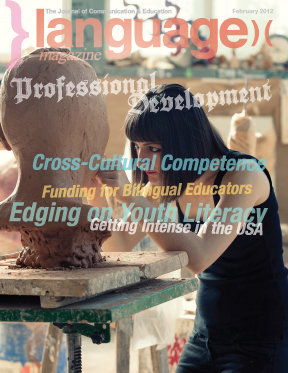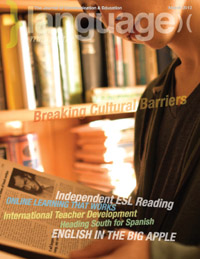Creating Your Own Space
Mindy Broderick raves about the functionality of Wikispaces for language classes
Talking in the Library
Jason Teshuba describes how access to online language learning programs is invigorating America’s libraries
Recognizing the Learner
Nile Stanley and Yue Meng explore the effect of culture on the learning process
Reading for Number One
Bruce B. Brown examines how independent reading can transform the route to English language acquisition
Eat Up the Big Apple
Lizzie Olster finds something for every student in New York City
In from the Outside
Kristal Bivona sees the value in traveling abroad for teacher development
Heading South for Spanish
Jennifer Timm discovers why Colombia and Chile are among South America’s most popular learning destinations
Reviews Connie K. Ho with enlightening Spanish stories for children
Last Writes Richard Lederer with a Charles Dickens quiz
March 2012
Equatorial Guinea Strengthens Connection to Portuguese
by Kristal Bivona
Portuguese was declared an official language of Equatorial Guinea last year in an effort to create a bond with other Lusophone countries and earn membership into the Community of Portuguese Language Countries (CPLC). While membership into the CPLC is still under review, Equatorial Guinea signed a Covenant of Technical Cooperation in February with the CPLC’s Instituto Internacional da Língua Portuguesa (International Institute of the Portuguese Language), an organ that aims to promote the Portuguese language within Lusophone countries while serving as a cultural ambassador in other countries.
The covenant outlines plans for a team of Lusophone linguists to travel to Equatorial Guinea to study Portuguese Creole from the Annobón province, which was an uninhabited island until Portuguese colonization in the 15th century. Due to geographic and cultural isolation, the Portuguese Creole spoken in Annobón is close to the Portuguese spoken at the time it was settled. The linguists hope to contextualize this archaic form of Portuguese on the spectrum of Lusophone languages and publish their findings. The Covenant also laid out a plan to develop the implementation of Portuguese in Equatorial Guinea and manage the cohabitation of Portuguese, Spanish and French as the three official languages.
Latvians Reject Proposal for Russian as Official Language
 On Saturday, February 18, Latvians rejected a proposal to give Russian status as an official language of the state. According to the Christian Science Monitor, Russian is not only considered the mother tongue of the country’s former Soviet occupiers but is also spoken by one-third of the Baltic country’s 2.1 million population. Ethnic Latvians saw the proposal as an encroachment on the country’s independence.
On Saturday, February 18, Latvians rejected a proposal to give Russian status as an official language of the state. According to the Christian Science Monitor, Russian is not only considered the mother tongue of the country’s former Soviet occupiers but is also spoken by one-third of the Baltic country’s 2.1 million population. Ethnic Latvians saw the proposal as an encroachment on the country’s independence.
The Central Election Commission reported that 75 percent of the voters were against instituting Russian as an official language.
“Latvia is the only place throughout the world where Latvian is spoken, so we have to protect it,” said Martins Dzerve, 37, in an article by the Christian Science Monitor. “But Russian is everywhere.”
However, there is a small percentage who believes that Russians should have been approved as a national language. This includes the country’s ethnic Russians and other minorities, many of whom live in the eastern part of Latvia close to Russia.
“Society is divided into two classes – one half has full rights, and the other half’s rights are violated,” said Aleksejs Yevdokimovs, 36, in a Christian Science Monitor article. “The Latvian half always employs a presumption of guilt toward the Russian half, so that we have to prove things that shouldn’t need to be proven.”
Government officials reflected on the dissension between those who supported and those who opposed the proposition. In a New York Times article, Prime Minister Valdis Dombrovskis, who was against the proposal, expressed gratitude for Latvian voters who denied the resolution but encouraged government officials to find a conciliatory solution between the two groups.
“What we need to think now is what additional measures could be done on integration and naturalization policies, including more opportunities to study Latvian,” said Prime Minister Valdis Dombrovskis in a telephone interview with the New York Times. He added, “It is clear that we need to look at what more we can do.”
To learn more about the issue, read the original articles here and here.
Inuit App for Children
To help his daughter retain the Inuit language, Vancouver-based Qajaaj Ellsworth has created an online game and application software. The language is indigenous to the North American Arctic as well as parts of subarctic Labrador.
Ellsworth’s product, Ilinniarnaqsivuq (Time for School), will focus on children age three to seven. It features three languages, English, Inuktitut¸ and Inuinnaqtun, to teach vocabulary such as animals, the alphabet, weather, colors, and numbers. Ellsworth hopes his application will be used both in school and at home.
“I have a daughter who is almost four years old, who is very comfortable with technology. She likes to play with our iPad, but there’s not much access to Inuktitut-language material,” Ellsworth told the Vancouver Sun.
February 2012
Teachers Matter

Somewhat surprisingly for an Administration that has made little headway in terms of education policy, the President’s State of the Union Address (see news, page 9) made education one of its key themes. The importance of teachers and their training was also mentioned: “Teachers matter. So instead of bashing them, or defending the status quo, let’s offer schools a deal. Give them the resources to keep good teachers on the job, and reward the best ones.”
However, the President also recognized the reality: “At a time when other countries are doubling down on education, tight budgets have forced States to lay off thousands of teachers. We know a good teacher can increase the lifetime income of a classroom by over $250,000.” More.
IN THIS ISSUE:
nechE s’@chE wAsOwû — This Land Gives to You
J’Nisha Towne documents the heroic effort to preserve the Euchee language
Institutional Choices
Language Magazine asks leading educators to weigh in on the pros and cons of university-affiliated institutes and private language schools
Teachers Doin’ It for Themselves
Kristal Bivona analyzes plans to put language and technology at the forefront of teacher education
Reading, Writing, and Giving Back
Kristal Bivona gets inspired by voluntary literacy projects
Crossing the Cultural Divide
Abdelilah Salim Sehlaoui argues that language educators must develop cross-cultural communicative competence
Increasing American Exports to China
Connie K. Ho explains how the government-backed 100,000 Strong Initiative is promoting study in China
Small Town, Big City
Lizzie Olster moons over Boston as a study abroad locale
Bilingual Boom
Funding resources to meet the growing demand for dual-language educators
Spotlight on Service-Learning
Connie K. Ho introduces StudyShare.org, the new hub for service learning
Last Writes
Richard Lederer on mighty Charles Dickens
Get Lit
Confetti
Aishah Allah speaks about her involvement with Get Lit, a nonprofit based in Los Angeles that fosters literacy through poetry. Students interpret and perform classic poetry and write their own response poems and original poetry. Language Magazine‘s upcoming February issue takes an in-depth look at non-state organizations that engage young readers and writers with literature outside of class.
To get involved with Get Lit, click here.
Donating Your Textual Body to Science
Linguists, sociologists, anthropologists, and psychologists want you to donate your text messages to science. The text4science project, also known as sms4science, aims to build a large corpus of text messages in different languages and dialects to examine the way in which text messaging is changing language and the way we learn to read and write. The project is coordinated by CENTAL, the Centre for Natural Language Processing at the Université catholique de Louvain, Belgium and includes researchers from Canada’s University of Montreal, University of Ottowa.
Researchers are interested in abbreviation patterns in text messages within different dialects of the same language, among men and women and across generations. According to Forbes Magazine, researchers theorize that abbreviated words are a consequence of laziness, rather a testament to linguistic creativity. Research out of Australia’s University of Tasmania links the ability to interpret and form “textisms” to improved literacy in children.
If you would like to donate you text messages to science, click here.
Timing of Reclassification Key to ELL Dropout Rate
The National Center for Research on Evaluation,
Standards, and Student Testing (CRESST) at the University of
California, Los Angeles has released a new report comparing student
enrollment history, achievement gaps, and persistence in school of
English Language Learning (ELL) students to non-ELL students. The
results show large achievement and socioeconomic gaps.
A major question that arose is the difficulty of knowing when to exit
an ELL student. Another important issue is the difficulty in providing
sufficient English language proficiency (ELP) curriculum in mainstream
classrooms. The report hopes to curb detriment that may result from
reclassifying an ELL student earlier than necessary.
High school dropout rates are 25 percent for ELL students and 15
percent for non-ELL students. Also, among ELL students, academic
achievement and grade retention are stronger predictors than behavioral
issues or differences in background. These findings may suggest
that school persistence in the ELL population may be a different
process than for non-ELL students. Results show that after accounting
for academic achievement, behavioral issues, background, and
district contexts, the longer a student is designated as an ELL, the
more likely he or she is to drop out.
CRESST focuses on research that may improve the quality of
learning and education in the U.S. This report is part of a larger study
to assess the validity of states’ existing systems of reclassifying ELLs
in terms of gross consequences of reclassification. The motivation of
this project arises from the simple question of when to exit ELL students.
To download the full report, visit www.cse.ucla.edu
January 2012
Shh… Don’t Mention Education
As we’re entering a Presidential election year, we thought it would be interesting to compare the prospective candidates’ positions on language education. Despite several requests, none of the candidates were prepared to spell out their position on the political hot potato of bilingual education, or even the less contentious subject of funding world language education. It’s hardly surprising, seeing as education has been largely ignored by most of the frontrunners.
However, much can be gleaned from past positions and current manifestos: More.
IN THIS ISSUE:
An Act to Follow
Language Magazine asks the experts what legislation they would like to see enacted during the New Year
Lessons in Quality
Adam Cooke and Nick Sacco explain how the accreditation process is impacting their private language school
Mother Tongue Key to World Education Growth
A bilingual approach not only improves educational outcomes in developing countries but could help close achievement gaps in the U.S.
Taking Teaching to Task
Juan José Vázquez-Caballero on how to create curricula to allow language students to be more engaged, motivated, and prepared for the real world
California Dreaming
Kristal Bivona swoons over San Diego as a study abroad destination
Celebrating Costa Rica’s Customs
Romy Morales suggests the inclusion of festivals to your itinerary or Spanish culture class
Census Shows Native Languages Count
Last Writes
Richard Lederer and Metaphors Be With You
Abu Dhabi Education Council Focuses on Improving Arabic Skills
 An assessment project titled “Tama’an” (Observe Carefully) was recently introduced by the Abu Dhabi Education Council (ADEC). Created to give students the necessary tools for school, it will focus on promoting national identity and increasing Arabic language skills.
An assessment project titled “Tama’an” (Observe Carefully) was recently introduced by the Abu Dhabi Education Council (ADEC). Created to give students the necessary tools for school, it will focus on promoting national identity and increasing Arabic language skills.
In terms of enhancing the Arabic reading and writing skills of students, more emphasis will be placed on reading, writing, speaking, listening, and analysis of texts. The project aims to develop the student’s utmost potential in language learning. Teachers will also be given assessment tools to improve students’ linguistic ability and to for research purposes.
According to the Khaleej Times Online, the ADEC has organized workshops, training sessions, and presentation over two days for 200 teachers in Al Tamayuz School in Al Ain and Al Afaq School in Abu Dhabi so that they may become more knowledgeable on the assessment project. Dr. Karima Al-Mazroui, the ADEC Arabic Curriculum Section Manager, noted that the new assessment tools would aid teachers to meet new standards set by the council.
The new initiative includes a number of tools. In terms of writing, teachers will be able to measure creative and general writing skills. In reading, teachers will be able to measure comprehension, textual analysis, and criticism. Lastly, teachers will be able to better measure communication skills such as speaking and listening.
To read more about the initiative, click here.





